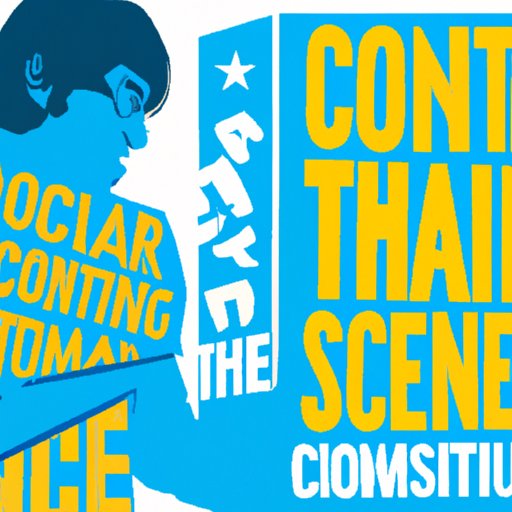Introduction
Counter culture is a term used to describe any group or movement that is opposed to or challenges the values and norms of mainstream society. It often refers to groups of people who are actively rejecting the dominant culture and advocating for social, political, and cultural change. This article will examine the history and characteristics of counter cultures, explore their impact on society, analyze the role of technology in counter culture activism, and investigate the relationship between counter culture and social change.
Examining the History and Characteristics of Counter Cultures
Counter culture originated in the 1950s and 1960s during the civil rights movement, when African Americans sought to end racial segregation and discrimination. Since then, counter culture has evolved to encompass many different movements and ideologies. Today, counter culture includes a wide variety of social movements, such as environmentalism, feminism, LGBTQ rights, and animal rights.
Counter culture can be divided into two main categories: ideological counter culture and lifestyle counter culture. Ideological counter culture is characterized by a rejection of traditional values and beliefs and a desire to create an alternative system of beliefs and values. Examples of ideological counter culture include communism, anarchism, and socialism. Lifestyle counter culture, on the other hand, is characterized by a rejection of traditional lifestyles and a desire to create an alternative lifestyle. Examples of lifestyle counter culture include punk, hippie, and hip-hop cultures.
Regardless of the type of counter culture, certain characteristics are common among all counter cultures. These characteristics include a shared identity, a commitment to social change, a rejection of mainstream values and beliefs, and a willingness to challenge existing power structures. Counter culture groups often have their own distinct fashion, language, music, and art, which serve to further differentiate them from mainstream culture.

Exploring the Impact of Counter Culture Movements on Society
Counter culture movements have had a profound impact on society. They have been instrumental in bringing about social change, encouraging political participation, and inspiring artistic expression.
Counter culture movements have been at the forefront of social change, challenging the status quo and advocating for greater equality and justice. Many of the most significant social movements of the last century, such as civil rights, women’s rights, and LGBT rights, were led by counter culture groups. These movements have helped to shape our society and make it more inclusive and equitable.
Counter culture movements have also encouraged greater political participation, particularly among marginalized groups. By challenging the status quo and advocating for change, counter culture movements have given voice to those who have traditionally been excluded from the political process. As a result, they have helped to expand democracy and ensure that everyone has a say in how society is run.
Finally, counter culture movements have inspired artistic expression. From the beat poets of the 1950s to the punk rockers of the 1970s, counter culture movements have provided a platform for artists to express themselves and explore new ideas. Counter culture art has often been controversial and provocative, but it has also been a powerful tool for social change.
Analyzing the Role of Technology in Counter Culture Activism
In recent years, technology has become an increasingly important tool for counter culture activists. Social media platforms like Twitter, Facebook, and Instagram have allowed activists to connect with each other, spread their message, and organize protests and demonstrations. Digital communication tools such as email, text messaging, and video conferencing have enabled activists to stay in touch and coordinate their efforts. And online communities such as Reddit and 4chan have provided a space for activists to share ideas and discuss strategy.
Technology has also enabled counter culture activists to reach a wider audience and amplify their message. Through social media, activists can quickly spread their message to thousands of people around the world. Through digital communication tools, activists can connect with each other and coordinate their efforts in real time. And through online communities, activists can find support and solidarity in the face of opposition.

Understanding the Differences Between Mainstream and Counter Culture
Despite the similarities between mainstream and counter culture, there are some important differences. The core values of mainstream culture tend to be focused on conformity and stability, while the core values of counter culture are often focused on individual freedom and social change. Mainstream culture tends to emphasize obedience to authority, while counter culture emphasizes questioning authority and challenging the status quo. Mainstream culture tends to accept existing social norms, while counter culture often seeks to challenge and even reject them.
The ideologies of mainstream and counter culture also differ. Whereas mainstream culture typically embraces capitalism and consumerism, counter culture often rejects these ideologies and advocates for more sustainable and equitable economic systems. Mainstream culture tends to prioritize profit over people and the environment, while counter culture often takes a more holistic view and strives to protect both people and the planet.

Investigating the Relationship Between Counter Culture and Social Change
Counter culture and social change are closely intertwined. Counter culture groups often advocate for social change, and their efforts can have a lasting impact on society. For example, the civil rights movement of the 1960s was a counter culture movement that resulted in major social changes, such as the passage of the Civil Rights Act of 1964 and the Voting Rights Act of 1965. Similarly, the women’s liberation movement of the 1970s was a counter culture movement that resulted in major advances for women’s rights, such as the passage of the Equal Rights Amendment.
Counter culture movements can also have a major impact on the political landscape. In recent years, counter culture activists have played an important role in shaping the political debate, particularly in the United States. For example, the Occupy Wall Street movement of 2011 raised awareness of economic inequality and helped to shift the discourse on economic policy. Similarly, the Black Lives Matter movement of 2013 sparked a nationwide conversation on race and racism and helped to bring about significant changes in police practices.
Finally, counter culture movements can have a major impact on art and culture. Counter culture art often serves as a form of protest and can be used to challenge existing power structures and inspire social change. Hip hop, for example, emerged in the 1970s as a form of counter culture art that challenged existing norms and inspired a generation of young people to fight for social justice.
Conclusion
Counter culture is a term used to describe any group or movement that is opposed to or challenges the values and norms of mainstream society. This article has examined the history and characteristics of counter cultures, explored their impact on society, analyzed the role of technology in counter culture activism, and investigated the relationship between counter culture and social change. Counter culture movements have had a profound impact on society, bringing about social change, encouraging political participation, and inspiring artistic expression. Ultimately, counter culture provides an important platform for social change and can help to create a more just and equitable world.
(Note: Is this article not meeting your expectations? Do you have knowledge or insights to share? Unlock new opportunities and expand your reach by joining our authors team. Click Registration to join us and share your expertise with our readers.)
